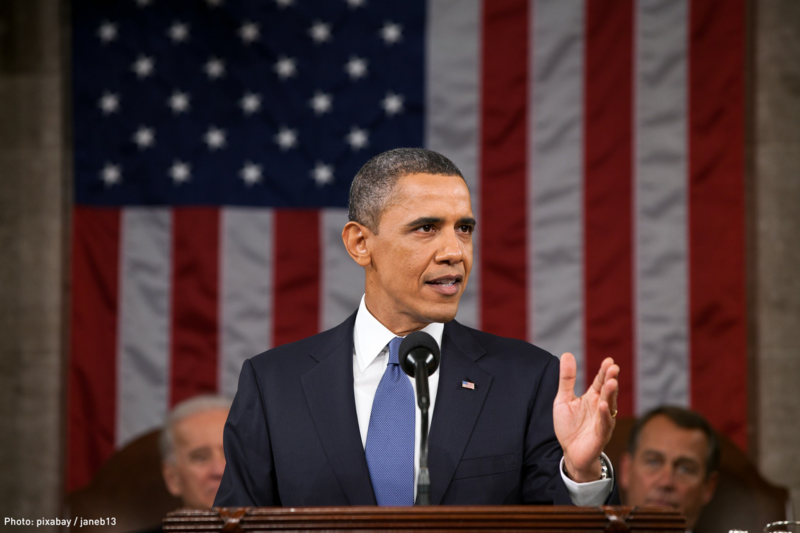As a Criminal Justice Reform Advocate, Obama’s Farewell Speech Felt Like a Full Circle Moment


I feel like I began this journey with President Obama more than eight years ago, when I was a Hill staffer and volunteered on his 2008 campaign. Almost eight years to the day, on January 20, 2009, I stood at the Capitol with millions from across the country in 20-degree weather and witnessed the swearing in of the first black president of the United States. That’s why when I received a ticket to attend his farewell speech this past Tuesday, it felt like a fitting end to a historic period in our country and, particularly, in my life.
Historic because at almost the same time that Barack Obama was sworn into the U.S. Senate, I began my work at the ACLU with long-time advocates to address the discriminatory crack cocaine federal law. At the time, a person caught with crack cocaine was sentenced to a prison sentence 100 times longer than a person caught with much more powder cocaine. Unsurprisingly, the law resulted in many Black people serving long federal sentences for small amounts of drugs.
It was after I left the ACLU and went to work on Capitol Hill at the House Judiciary Committee that the first Black president would sign the Fair Sentencing Act in 2010, which reduced the 100-to-1 crack cocaine disparity to 18 to one. The FSA’s sentencing guidelines reduced long and harsh sentences for so many people and gave others an opportunity to return home from prison to their families.
There was no way I could have known then, that after leaving the Hill and returning to the ACLU, that our coalitions’ numerous meetings with President Obama’s White House staff would be so successful. We asked them to encourage the president to use his clemency power more frequently. They did, and it resulted in over 1,200 people receiving a presidential clemency — more than the last 11 presidents combined.
As Sally Yates, Department of Justice Deputy Attorney General, said at a Brookings Institute event in October:
“[… there are folks out there that [have] relatively low-level street drug crimes, and they came to the federal system, and because of the Three Strikes Law that we had in place, they then got mandatory life. You know, I read these petitions of individuals who will die in federal prison for a non-violent drug crime, and that’s just not right.”
As an African-American woman invested in reforming the criminal justice system, I completely understand how Deputy Attorney General Yates feels about people left to die in prison for nonviolent drug convictions — it’s just not right.
The irony is not lost on me that on the same day that President Obama and the country was celebrating his legacy — especially his important work to reform the justice system — that the attorney general nominee Sen. Jeff Sessions was testifying before the Senate Judiciary Committee defending his record on a number criminal justice and civil rights issues. The real irony of the timing of Sessions’ nomination hearing, and all the concerns express by the ACLU and other groups about his record, is that much of Obama’s criminal justice legacy is irrefutably tied to the fact that his Attorney Generals Eric Holder and Loretta Lynch supported the reforms. Unfortunately, it is clear that if Sen. Sessions is confirmed as the next attorney general, he will not support reforms to the criminal justice system and will likely work to turn back many of the important policy changes made by Attorney Generals Holder and Lynch.
Before we start thinking about the future, I believe we should celebrate the achievements of the past. For me, the most memorable moment at Tuesday’s uplifting farewell speech in Chicago was when I looked across the crowd of more than 20,000 people waiting to get in and saw the familiar face of Reynolds Wintersmith, waving as he stood in line to enter the convention center. This was such a poignant moment for me because Reynolds, who the ACLU featured in our “A Living Death: Life Without Parole for Nonviolent Offenses” report, was in federal prison just four years ago for a nonviolent crack cocaine crime since he was 17 years old, serving a life sentence with no chance of parole. And to think that Reynolds is back in his hometown of Chicago, witnessing the first Black president, who commuted his life sentence, make his farewell speech to the nation was deeply moving and a full circle moment.
How could I not end this journey that started over eight years ago attending President Obama’s farewell speech in Chicago on Tuesday night? Even though his legacy on other civil rights and civil liberties issues may not be as historic as on criminal justice reform, there are now thousands of mothers and fathers in this country who are home with their children because of his efforts to commute sentences and his administration’s support of resentencing. President Obama and his administration had the courage to reject the status quo and rethink the federal justice system to create fairness and justice for people in prison — and for those it will affect in the future.
And that’s a legacy to be proud of.


